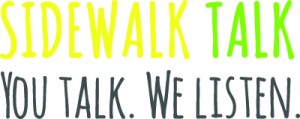Is Stigma Keeping You From Therapy?
 A close relative recently lost her husband of 60 years. This has been, to say the least, heart wrenching for her – a lonely, isolating, completely life-shattering experience. I was relieved to hear she started seeing a therapist for the first time. She shared that when she opened up to friends and family about going to therapy, she was surprised to find out many people she knows are actually in therapy and have never mentioned a word about it. What if they had? Would she have felt inclined to check it out sooner had she known so many of her peers were seeking help?
A close relative recently lost her husband of 60 years. This has been, to say the least, heart wrenching for her – a lonely, isolating, completely life-shattering experience. I was relieved to hear she started seeing a therapist for the first time. She shared that when she opened up to friends and family about going to therapy, she was surprised to find out many people she knows are actually in therapy and have never mentioned a word about it. What if they had? Would she have felt inclined to check it out sooner had she known so many of her peers were seeking help?
I recently met a young woman from Central America who told me that in her city people are much more out in the open about going to therapy than in San Francisco. Whaaaat???? At first I was shocked to hear this. After all, this is an important hub of the industry – excellent graduate training programs people travel to from around the world, holistic counseling centers galore, all kinds of self-help and personal development workshops and centers in close proximity, and cutting edge research institutions.
Yet, maybe this isn’t so shocking. I’m a therapist, so most people I know are really into therapy and love talking about it. But that’s not by any means the majority of folks in San Francisco. And the culture here is changing. It’s not all artsy, touchy-feely, groovy, counter-culture anymore. All kinds of people are coming here to work in the tech industry which is becoming synonymous with San Francisco, but not necessarily synonymous with “let’s talk about our feelings”.
Beyond that, in the last few years I’ve met a lot of young adults (of the artsy, touchy-feely, counter-culture variety) who’ve thought about going to therapy but were afraid to make the leap and overwhelmed by the myriad of seemingly indistinguishable therapists. How are you supposed to know who to call if you’ve never been to therapy before and don’t know anyone who can personally refer you to someone? Why would you entrust your life story to a random so and so with some acronym you don’t recognize after her name.
For many of the young folks I meet, therapy seems out of reach – something you only do if you’re rich, crazy, or both. But I have friends in this demographic who have gone from fear of therapy to actually doing it because, as their friend, they saw that a therapist is a person who makes dirty jokes, feels insecure sometimes, and seeks help too. They’ve heard me talk about how I work, as well as my personal experiences in therapy. And, I’ve been able to give them names of clinicians I trust. In essence, I helped them navigate “the system” and normalized therapy. I didn’t purposely go around promoting and pushing. People were already curious and they just needed information!
Of the myriad factors that contribute to stigma and inaccessibility, I wonder…
Are therapists reinforcing stigma?
By being so enigmatic, do therapists and the industry as a whole inadvertently contribute to the stigma attached to seeking therapy. For good reasons we keep things confidential and we work to create a safe space where people can open up about things they’ve never told anyone – sometimes serious trauma. But does our current set-up, with unmarked buildings, security codes, therapists frantically avoiding clients in public spaces, and whispering in waiting rooms, contribute to a sense that client’s secrets should be secret and that therapy should be secret too? Is that the message we’re inadvertently reinforcing?
Do we maintain a power imbalance that’s intimidating? Many therapists are extremely private for the sake of keeping strong boundaries, which is beneficial for therapy especially if they work from more traditional models. However, I’ve found that young adults who’ve had negative experiences in therapy or are seeking therapy for the first time, stick around because I show up with a little bit more of myself. In treating eating disorders, my clients want to know that I’ve been through it too and I don’t blame them, nor do I withhold this information. This isn’t right for every client or every phase of treatment but it often helps build a trusting, collaborative relationship and I don’t feel like I’m fighting to hold back who I am as a person and the gifts I have to offer.
What can we do?
This probably won’t come as a surprise, but in several studies researchers found that stigma around seeking mental health services was greatly reduced by TALKING ABOUT IT. Further, these studies point to face-to-face contact as the most effective method for reducing stigma and increasing help-seeking behavior. My experiences with friends fit right in with this. And because of what I’ve been observing, I’ve become increasingly passionate about challenging the status quo around how we reach people and destigmatize therapy. I want therapists to offer free panel discussions to the public and to find other creative ways to create opportunities for face-to-face contact in low-pressure settings.
Recently, Traci Ruble, founder of Psyched in San Francisco, and I have embarked on a project called “Sidewalk Talk”. On May 7th, in honor of Mental Health Awareness Month, we’re getting volunteer “listeners” out on the street with folding chairs, inviting passersby to  sit down and have a chance to be listened to for a few minutes. How often do we get that opportunity? The aim is to have our “listeners” attach a non-threatening face to therapy and give people the opportunity to have their innate desire to be heard normalized – right out in the open. And we want to raise awareness about the importance of listening and being heard, something that is often missing from our busy lives. To learn more about Sidewalk Talk or contribute to our Kickstarter campaign, click here.
sit down and have a chance to be listened to for a few minutes. How often do we get that opportunity? The aim is to have our “listeners” attach a non-threatening face to therapy and give people the opportunity to have their innate desire to be heard normalized – right out in the open. And we want to raise awareness about the importance of listening and being heard, something that is often missing from our busy lives. To learn more about Sidewalk Talk or contribute to our Kickstarter campaign, click here.
A few months ago I was talking to someone at a party about what I do. He kept asking questions even though I wasn’t really in the mood to wear my therapist hat. The funniest part was that he kept intermittently interjecting that he doesn’t need therapy. As if he was trying to convince both of us. I watched stigma, ambivalence, curiosity, and confusion (all mixed in with a little booze) play itself out before my very eyes. And I kept thinking how glad I was that I could give him a little information and remind him that, no, I’m not analyzing him.
Bonus Points (not that I’m counting)
If you see a therapist, do you talk about it with people in your life? If not, think about what stops you. If you’d be willing, let one person know. You might be doing them a huge favor.
Acknowledgments
Thank you to Ryan Krickow for helping me research this article and inspiring me to fight stigma and use therapy to make the world a better place.
Thank you to Traci Ruble for being such a kick-ass partner in therapy activism and inspiring me with your passion.
Thank you to Pilar Dellano for her super awesome editing skills and her poignant yet hilarious writing.
References (those “studies” I refer to)
Corrigan, P. W., Morris, S. B., Michaels, P. J., Rafacz, J. D., & Rüsch, N. (2012). Challenging the public stigma of mental illness: A meta-analysis of outcome studies. Psychiatric Services, 63(10), 963-973.
Eisenberg, D., Downs, M. F., Golberstein, E., & Zivin, K. (2009). Stigma and help seeking for mental health among college students. Medical Care Research and Review, 66(5), 522-541.
